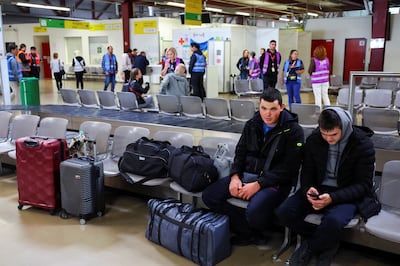German Chancellor Olaf Scholz was confronted with a wishlist of demands to tackle illegal migration on Monday as voter concern grows over asylum seekers filling up shelters.
A surge in asylum claims, mainly by people from Syria, Afghanistan and Turkey, is the key flashpoint at a summit between Mr Scholz and the leaders of Germany’s 16 states.
An alliance of German cities and local authorities on Monday said many places were “well beyond the limit” in providing accommodation and care after more than 230,000 asylum claims this year.
The group “expects a new start in migration policy”, said its director Gerd Landsberg, who added Mr Scholz should adopt the motto that “our hearts are big but our capabilities are limited”.
An Ipsos poll published on Monday showed 44 per cent of Germans naming immigration as one of their top three concerns, up from 33 per cent a month ago and a higher share than in the UK, US or Italy.
“We need clarity and order. We have to ensure that those who are here and are allowed to remain here can be accommodated in a system that is not overburdened,” said the state premier of Saarland, Anke Rehlinger, as the talks began.
“We equally need to ensure that those who are not allowed to stay here are returned.”
Policy demands
With the far-right Alternative for Germany (AfD) gaining support, ministers have responded with a drive to expel suspected clan criminals and by seeking deportation deals with countries such as Morocco and Kenya.
However, Mr Scholz is being urged to go further with proposals from MPs and local authorities such as:
· Adding Tunisia, Morocco, Algeria and India to the list of “safe countries” with dim prospects of asylum
· Building “transit centres” at Germany’s borders from which people could be swiftly deported
· Setting a cap of 200,000 people per year to claim asylum in Germany
· Cutting off funding for Mediterranean rescue operations, a subject that has angered Italy
· Giving asylum seekers a digital “refugee ID” that would prove their identity, status, skills and health requirements
· Replacing cash support to migrants with a pre-paid bank card that prevents them sending money home.
“Our social security can no longer be a pull factor for illegal migration,” said Christoph Meyer, a senior liberal MP from within the ranks of Mr Scholz’s three-party coalition.
Cutting off cash payments would interrupt the “circular flow” of money to smuggling groups, he said.

Pro-migration groups agree that accommodation is running low but are calling on ministers to allow asylum seekers to move in with their families at an earlier date.
Some youngsters are “living in overcrowded accommodation, standards are increasingly being lowered and aid for children and young people is barely being included”, said Sophia Eckert of human rights group Terre des Hommes.
Sharp rise in asylum claims
German government statistics show almost 234,000 people have submitted first-time asylum claims this year, a rise of more than 70 per cent compared to 135,000 in the same period of 2022.
Syrians are the largest group with about 72,000 new applications, followed by people from Afghanistan (40,000), Turkey (35,000), Iraq (9,000) and Iran (8,000). Germany has also taken in more than a million Ukrainian refugees since the war with Russia broke out.
Several European countries are grappling with how to manage the steady stream of arrivals. France’s Senate is expected to begin considering a bill this week that would make it easier to remove people from the country.
Austria said last week it was lobbying EU countries to allow asylum claims to be outsourced to third countries, in a scheme modelled on Britain’s controversial Rwanda policy.
The UK plan has yet to get off the ground because of legal challenges, with ministers awaiting a verdict from the Supreme Court on whether deportations to Rwanda are legal.







